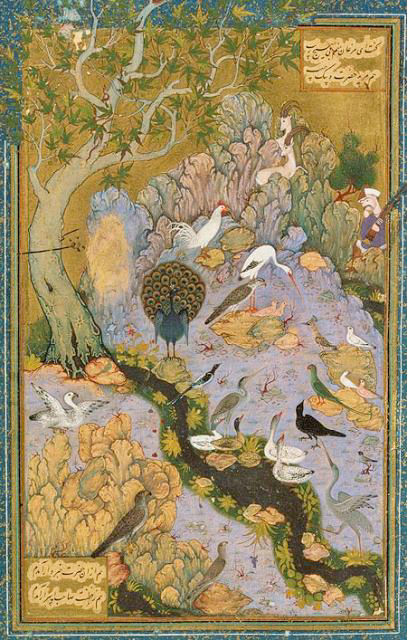
The Conference of the Birds or Speech of the Birds, completed around 1177CE, is a Sufi classic by the Persian poet Farid ud-Din Attar.
The book describes how a whole nation of birds set out on a journey to find the hidden master, the Simorg, the first among birds. In the end, thirty birds arrive and find their own reflections, experience an apotheosis and eventually return into the world. Attar speaks extensively on the many obstacles and challenges the birds encounter and on how many turn back and are lost to the quest. Attar frequently uses romantic love as a metaphor for spiritual quest.
Many references to esoteric principles are found throughout the book. A Cassiopaean interpretation of the story could be that the birds set out to find the truth and in the end, encountered their future selves. However, this future self was also a result of their long journey. In this sense, it was not an external deity but a potential created from themselves. Also, note that the Simorg is a sort of group entity.
The below is an excerpt from the end:
There in the Simorgh’s radiant face they saw
Themselves, the Simorgh of the world - with awe
They gazed, and dared at last to comprehend
They were the Simorgh and the journey’s end.
They see the Simorgh - at themselves they stare,
And see a second Simorgh standing there;
They look at both and see the two are one,
That this is that, that this, the goal is won.
They ask (but inwardly; they make no sound)
The meaning of these mysteries that confound
Their puzzled ignorance - how is it true
That ‘we’ is not distinguished here from ‘you’?
And silently their shining Lord replies:
‘I am a mirror set before your eyes,
And all who come before my splendour see
Themselves, their own unique reality;
You came as thirty birds and therefore saw
These selfsame thirty birds, not less nor more;
If you had come as forty, fifty - here
An answering forty, fifty, would appear;
Though you have struggled, wandered, travelled far,
It is yourselves you see and what you are.’
(Who sees the Lord? It is himself each sees;
What ant’s sight could discern the Pleiades?
What anvil could be lifted by an ant?
Or could a fly subdue an elephant?)
’How much you thought you knew and saw; but you
Now know that all you trusted was untrue.
Though you traversed the Valleys’ depths and fought
With all the dangers that the journey brought,
The journey was in Me, the deeds were
Mine - You slept secure in
Being’s inmost shrine. And since you came as thirty birds, you see
These thirty birds when you discover Me,
The Simorgh, Truth’s last flawless jewel, the light
In which you will be lost to mortal sight,
Dispersed to nothingness until once more
You find in Me the selves you were before.‘
Then, as they listened to the Simorgh’s words,
A trembling dissolution filled the birds -
The substance of their being was undone,
And they were lost like shade before the sun;
Neither the pilgrims nor their guide remained.
The Simorgh ceased to speak, and silence reigned.
The ashes of Hallaj Hallaj’s corpse was burnt and when the flame
Subsided, to the pyre a sufi came
Who stirred the ashes with his staff and said:
‘Where has that cry “I am the Truth” now fled?
All that you cried, all that you saw and knew,
Was but the prelude to what now is true.
The essence lives; rise now and have no fear,
Rise up from ruin, rise and disappear -
All shadows are made nothing in the one
Unchanging light of Truth’s eternal sun.‘
A hundred thousand centuries went by,
And then those birds, who were content to die,
To vanish in annihilation, saw
Their Selves had been restored to them once more,
That after Nothingness they had attained
Eternal Life, and self-hood was regained.
This Nothingness, this Life, are states no tongue
At any time has adequately sung -
Those who can speak still wander far away
From that dark truth they struggle to convey,
And by analogies they try to show The forms men’s
partial knowledge cannot know. (But these are not
the subject for my rhyme; They need another book, another time.
